初一英语介词用法与练习
七年级上册英语地点介词to,into,onto用法及练习
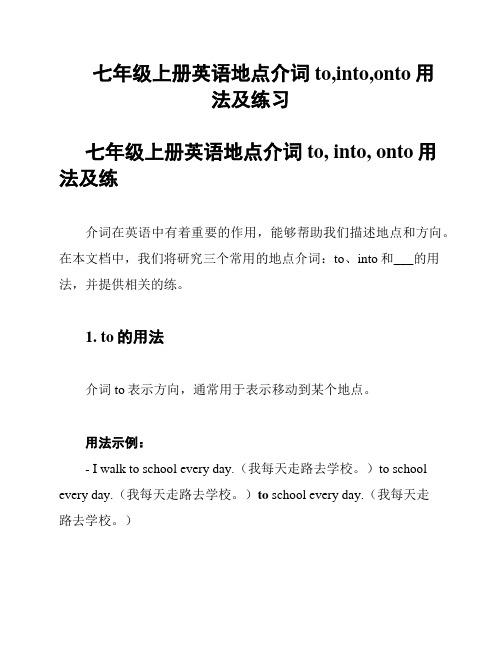
七年级上册英语地点介词to,into,onto用法及练习七年级上册英语地点介词to, into, onto用法及练介词在英语中有着重要的作用,能够帮助我们描述地点和方向。
在本文档中,我们将研究三个常用的地点介词:to、into和___的用法,并提供相关的练。
1. to的用法介词to表示方向,通常用于表示移动到某个地点。
用法示例:- I walk to school every day.(我每天走路去学校。
)to school every day.(我每天走路去学校。
)to school every day.(我每天走路去学校。
)- She goes to the park with her friends.(她和朋友们一起去公园。
)to the park with her friends.(她和朋友们一起去公园。
)to the park with her friends.(她和朋友们一起去公园。
)2. into的用法介词into表示进入某个地点的动作。
用法示例:- The cat jumped into the box.(猫跳进了盒子里。
)into the box.(猫跳进了盒子里。
)into the box.(猫跳进了盒子里。
)- We went into the ___ dinner.(我们进入餐厅吃晚饭。
)into the restaurant to have dinner.(我们进入餐厅吃晚饭。
)into the restaurant to have dinner.(我们进入餐厅吃晚饭。
)3. onto的用法介词onto表示到达某个平面或表面的动作。
用法示例:- The book ___.(书掉到了地板上。
)onto the floor.(书掉到了地板上。
)onto the floor.(书掉到了地板上。
)- ___ the roof of the house.(他爬上了屋顶。
)onto the roof of the house.(他爬上了屋顶。
初一英语介词知识点及专项练习

初一英语介词知识点及专项练习初一英语介词专练(知识点及题)介词又叫前置词,是一种虚词。
介词分为三种,一种是简单介词,如at。
in。
on。
beside。
to。
for等;另一种是短语介词,即由两个以上的词组组成的短语,如in front of。
because of。
out of。
instead of等;还有一种叫二重介词,如until after。
from behind等。
一)介词的句法介词不能独立在句中做成份,介词后必须与名词、代词、或动名词构成介词短语在句中充当一个成份,表示人、物、事件等与其它人、物、事件等之间的关系。
1、作定语:The book on the table is XXX.2、作状语:XXX.(表时间);3、作表语:XXX.4、作宾语补足语:I found him in the office.二)主要介词区别1、透露表现工夫的at。
in。
on:at透露表现少焉的工夫,如:at 8 o'clock,经常使用词组有:at noon。
at night。
in透露表现一段的工夫,如:in the morning。
in the afternoon。
on老是跟日子有关,on Monday。
on Christmas。
2、透露表现工夫的since和from:since透露表现从曩昔到目前的一段工夫的进程,常与目前完成时连用。
from透露表现从工夫的某一点入手下手,不触及与目前的干系。
普通多与目前时、曩昔时、未来时连用。
如:XXX from today./ We have not seen each other since 1995.3、表示时间的in和after:两者都表示"在(某个时间)之后,区别在于in表示"在(一段时间)之后",而after则表示"在(某一具体时间点之后)",in短语和将来时态连用,after短语和过去时态或将来时态连用。
初中七年级的常用介词用法及练习包括答案
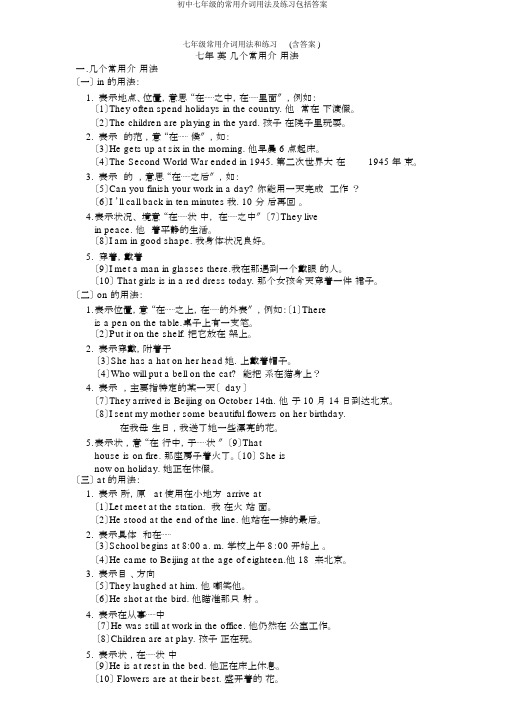
七年级常用介词用法和练习(含答案 )七年英几个常用介用法一.几个常用介用法〔一〕 in 的用法:1.表示地点、位置,意思“在⋯⋯之中,在⋯⋯里面〞,例如:〔1〕They often spend holidays in the country. 他常在下渡假。
〔2〕The children are playing in the yard. 孩子在院子里玩耍。
2.表示的范,意“在⋯⋯候〞,如:〔3〕He gets up at six in the morning. 他早晨 6 点起床。
〔4〕The Second World War ended in 1945. 第二次世界大在1945 年束。
3.表示的,意思“在⋯⋯之后〞,如:〔5〕Can you finish your work in a day? 你能用一天完成工作?〔6〕I ’ll call back in ten minutes我. 10 分后再回。
4.表示状况、境意“在⋯⋯状中,在⋯⋯之中〞〔7〕They livein peace. 他着平静的生活。
〔8〕I am in good shape. 我身体状况良好。
5.穿着,戴着〔9〕I met a man in glasses there.我在那遇到一个戴眼的人。
〔10〕 That girls is in a red dress today. 那个女孩今天穿着一件裙子。
〔二〕 on 的用法:1.表示位置,意“在⋯⋯之上,在⋯⋯的外表〞,例如:〔1〕Thereis a pen on the table.桌子上有一支笔。
〔2〕Put it on the shelf. 把它放在架上。
2.表示穿戴,附着于〔3〕She has a hat on her head她.上戴着帽子。
〔4〕Who will put a bell on the cat? 能把系在猫身上?4.表示,主要指特定的某一天〔 day 〕〔7〕They arrived is Beijing on October 14th. 他于 10 月 14 日到达北京。
初一英语介词用法总结练习题20题(带答案)
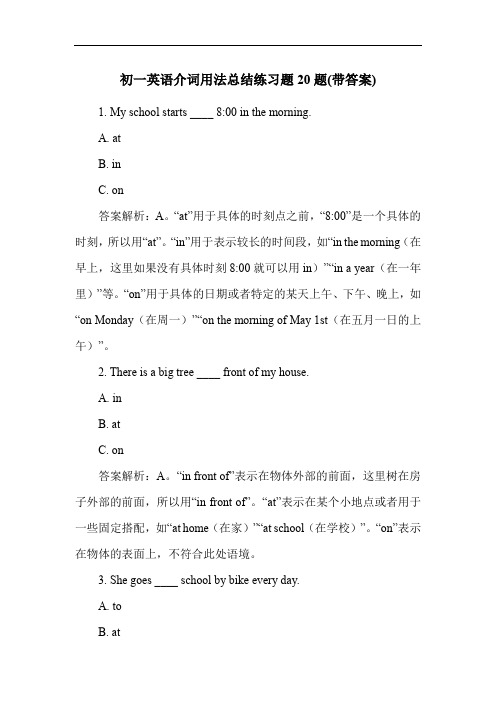
初一英语介词用法总结练习题20题(带答案)1. My school starts ____ 8:00 in the morning.A. atB. inC. on答案解析:A。
“at”用于具体的时刻点之前,“8:00”是一个具体的时刻,所以用“at”。
“in”用于表示较长的时间段,如“in the morning( 在早上,这里如果没有具体时刻8:00就可以用in)”“in a year 在一年里)”等。
“on”用于具体的日期或者特定的某天上午、下午、晚上,如“on Monday 在周一)”“on the morning of May 1st 在五月一日的上午)”。
2. There is a big tree ____ front of my house.A. inB. atC. on答案解析:A。
“in front of”表示在物体外部的前面,这里树在房子外部的前面,所以用“in front of”。
“at”表示在某个小地点或者用于一些固定搭配,如“at home( 在家)”“at school( 在学校)”。
“on”表示在物体的表面上,不符合此处语境。
3. She goes ____ school by bike every day.A. toB. atC. in答案解析:A。
“go to school”是固定搭配,表示去上学,“to”表示方向,指向学校这个目的地。
“at”和“in”不符合这个搭配的用法。
4. My birthday is ____ July.A. inB. onC. at答案解析:A。
“in”用于表示在某个月份,“July( 七月)”是月份,所以用“in”。
“on”用于具体日期,“at”用于具体时刻,都不符合这里的用法。
5. The cat is sleeping ____ the chair.A. underB. inC. on答案解析:A。
“under”表示在物体的下方,猫在椅子下面睡觉,所以用“under”。
(完整版)初中英语介词用法详解与练习
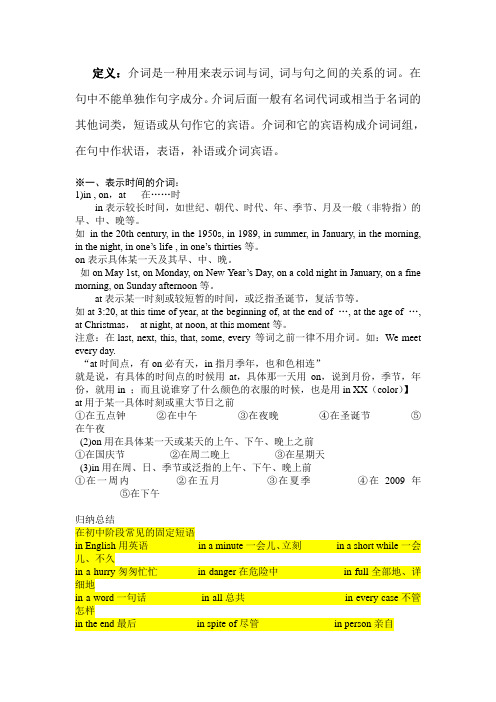
定义:介词是一种用来表示词与词, 词与句之间的关系的词。
在句中不能单独作句字成分。
介词后面一般有名词代词或相当于名词的其他词类,短语或从句作它的宾语。
介词和它的宾语构成介词词组,在句中作状语,表语,补语或介词宾语。
※一、表示时间的介词:1)in , on,at 在……时in表示较长时间,如世纪、朝代、时代、年、季节、月及一般(非特指)的早、中、晚等。
如in the 20th century, in the 1950s, in 1989, in summer, in January, in the morning, in the night, in one’s life , in one’s thirties等。
on表示具体某一天及其早、中、晚。
如on May 1st, on Monday, on New Year’s Day, on a cold night in January, on a fine morning, on Sunday afternoon等。
at表示某一时刻或较短暂的时间,或泛指圣诞节,复活节等。
如at 3:20, at this time of year, at the beginning of, at the end of …, at the age of …, at Christmas,at night, at noon, at this moment等。
注意:在last, next, this, that, some, every 等词之前一律不用介词。
如:We meet every day.“at时间点,有on必有天,in指月季年,也和色相连”就是说,有具体的时间点的时候用at,具体那一天用on,说到月份,季节,年份,就用in ;而且说谁穿了什么颜色的衣服的时候,也是用in XX(color)】at用于某一具体时刻或重大节日之前①在五点钟______②在中午________③在夜晚________④在圣诞节________⑤在午夜_________(2)on用在具体某一天或某天的上午、下午、晚上之前①在国庆节_________②在周二晚上_________③在星期天_________(3)in用在周、日、季节或泛指的上午、下午、晚上前①在一周内_________②在五月_________③在夏季_________④在2009年_________⑤在下午_________归纳总结在初中阶段常见的固定短语in English用英语in a minute一会儿、立刻in a short while一会儿、不久in a hurry匆匆忙忙in danger在危险中in full全部地、详细地in a word一句话in all总共in every case不管怎样in the end最后in spite of尽管in person亲自in fact事实上in good health身体健康的in front of在……前面in some ways在某些方面in common共同的in public当众☆考题再现:---Who was the first man with A(h1n1) flu in mainland China know for sure?---________May 11,2009.A InB OnC ForD Since2、before、afterbefore表示“在某时刻或某件事之前”,after用在时刻或某件事之后。
七年级上册英语时间介词at,in,on用法及练习
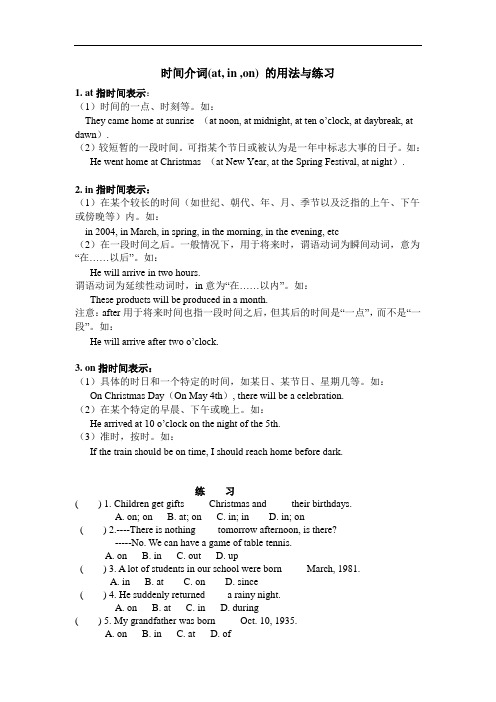
时间介词(at, in ,on) 的用法与练习1. at指时间表示:(1)时间的一点、时刻等。
如:They came home at sunrise (at noon, at midnight, at ten o’clock, at daybreak, at dawn).(2)较短暂的一段时间。
可指某个节日或被认为是一年中标志大事的日子。
如:He went home at Christmas (at New Year, at the Spring Festival, at night).2. in指时间表示:(1)在某个较长的时间(如世纪、朝代、年、月、季节以及泛指的上午、下午或傍晚等)内。
如:in 2004, in March, in spring, in the morning, in the evening, etc(2)在一段时间之后。
一般情况下,用于将来时,谓语动词为瞬间动词,意为“在……以后”。
如:He will arrive in two hours.谓语动词为延续性动词时,in意为“在……以内”。
如:These products will be produced in a month.注意:after用于将来时间也指一段时间之后,但其后的时间是“一点”,而不是“一段”。
如:He will arrive after two o’clock.3. on指时间表示:(1)具体的时日和一个特定的时间,如某日、某节日、星期几等。
如:On Christmas Day(On May 4th), there will be a celebration.(2)在某个特定的早晨、下午或晚上。
如:He arrived at 10 o’cloc k on the night of the 5th.(3)准时,按时。
如:If the train should be on time, I should reach home before dark.练习( ) 1. Children get gifts ____ Christmas and ____ their birthdays.A. on; onB. at; onC. in; inD. in; on( ) 2.----There is nothing ____tomorrow afternoon, is there?-----No. We can have a game of table tennis.A. onB. inC. outD. up( ) 3. A lot of students in our school were born ____ March, 1981.A. inB. atC. onD. since( ) 4. He suddenly returned____ a rainy night.A. onB. atC. inD. during( ) 5. My grandfather was born ____ Oct. 10, 1935.A. onB. inC. atD. of( ) 6. The train is starting ___ five minutes.A. inB. atC. forD. still( ) 7. Mike does his exercises ____ seven _____ the evening.A. on; toB. at; inC. by; ofD. at; on( ) 8. Children wake up very early ____ the morning of Christmas Day.A. inB. onC. forD. at( ) 9 ____ a cold winter morning, I met her in the street.A. InB. OnC. AtD. For( ) 10 It happened to be very cold____ the morning of our sports meeting.A. atB. onC. withD. of( ) 11. Why did you get up so early ___ this morning.A. onB. /C. atD. in( ) 12. He went to Shanghai___ September 3, 1991 and came back___ a cold morning last year.A. in; onB. on; inC. on; onD. in; in( ) 13. Lucy was born____ the night of May 12, 1984. . ...A. onB. inC. atD. to( ) 14. Mrs Brown came to China ____ 1996.A.onB. ofC. to,D. in( ) 15 ___ the morning of November 20, 1915, the workers came to Chicago to show their mourning of Joe Hill.A. OnB. InC. OnD. At( ) 16. Ann moved ___ Hangzhou ___ September, 1992.A. /; inB. to; inC. to; on D, in; in( ) 17. They started off ___ an autumn afternoon.A. duringB. atC. inD. on( ) 18. He often goes ____ school ____ six thirty ____ the morning.A. for; to; inB. to; at; inC. to; for; at D, for; at; to( ) 19. He arrived ___ Shanghai ___ 9: 30 ___ March 5.A. at; in; atB. to; on; atC. in; on; atD. in; at; on( ) 20.The English teacher told me to get there____ half past ten.A: in B. at C. on D. of答案:B A A A A A B B B B BC AD B A D B D B。
七年级上册英语地点介词at,in,on用法及练习

七年级上册英语地点介词at,in,on用法及练习七年级上册英语地点介词at,in,on用法及练地点介词是英语语法中的一部分,用于描述人或事物的位置。
在这篇文档中,我们将讨论七年级上册英语中常见的地点介词:at,in和on的用法。
同时,我们也将提供一些练题来帮助你巩固所学内容。
1. at的用法- 用于表示具体的位置或地点,例如:- at school (在学校)- at the park (在公园)- at the bus stop (在公交车站)- 用于表示具体的时间点,例如:- at 9 o'clock (在九点)- at lunchtime (在午餐时间)- at night (在晚上)2. in的用法- 用于表示大的地点范围,例如:- in Beijing (在北京)- in the park (在公园)- in the classroom (在教室)- 用于表示季节、月份、年代等时间段,例如:- in summer (在夏季)- in October (在十月)- in the 1990s (在上世纪九十年代)3. on的用法- 用于表示具体的表面或平面,例如:- on the desk (在桌子上)- on the wall (在墙上)- on the floor (在地板上)- 用于表示具体的日期或星期几,例如:- on Monday (在星期一)- on June 1st (在六月一日)- on New Year's Day (在元旦)练题:填入适当的地点介词(at, in, on)来完成下列句子:1. I will meet you ___ the library.2. The cat is ___ the table.3. We have a class ___ 9 o'clock.4. They are playing soccer ___ the park.5. The party is ___ Friday night.答案:1. at2. on3. at4. in5. on希望本文对你理解七年级上册英语地点介词的用法有所帮助。
【初中英语】 介词的用法归纳练习精品资料
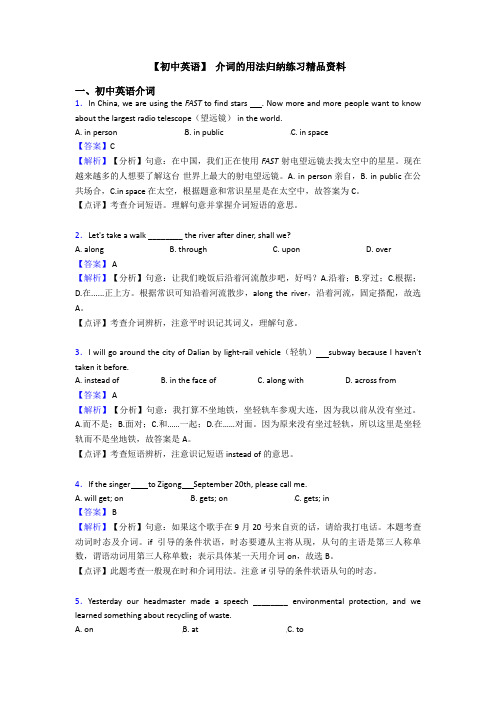
【初中英语】介词的用法归纳练习精品资料一、初中英语介词1.In China, we are using the FAST to find stars . Now more and more people want to know about the largest radio telescope(望远镜) in the world.A. in personB. in publicC. in space【答案】C【解析】【分析】句意:在中国,我们正在使用FAST 射电望远镜去找太空中的星星。
现在越来越多的人想要了解这台世界上最大的射电望远镜。
A. in person亲自,B. in public在公共场合,C.in space 在太空,根据题意和常识星星是在太空中,故答案为C。
【点评】考查介词短语。
理解句意并掌握介词短语的意思。
2.Let's take a walk ________ the river after diner, shall we?A. alongB. throughC. uponD. over【答案】 A【解析】【分析】句意:让我们晚饭后沿着河流散步吧,好吗?A.沿着;B.穿过;C.根据;D.在......正上方。
根据常识可知沿着河流散步,along the river,沿着河流,固定搭配,故选A。
【点评】考查介词辨析,注意平时识记其词义,理解句意。
3.I will go around the city of Dalian by light-rail vehicle(轻轨) subway because I haven't taken it before.A. instead ofB. in the face ofC. along withD. across from【答案】 A【解析】【分析】句意:我打算不坐地铁,坐轻轨车参观大连,因为我以前从没有坐过。
A.而不是;B.面对;C.和……一起;D.在……对面。
- 1、下载文档前请自行甄别文档内容的完整性,平台不提供额外的编辑、内容补充、找答案等附加服务。
- 2、"仅部分预览"的文档,不可在线预览部分如存在完整性等问题,可反馈申请退款(可完整预览的文档不适用该条件!)。
- 3、如文档侵犯您的权益,请联系客服反馈,我们会尽快为您处理(人工客服工作时间:9:00-18:30)。
初一英语介词用法与练习for1. 表示“当作、作为”。
如:I like some bread and milk for breakfast.我喜欢把面包和牛奶作为早餐。
What we have for supper?我们晚餐吃什么?2. 表示理由或原因,意为“因为、由于”。
如:Thank you for helping me with my English.谢谢你帮我学习英语。
Thank you for your last letter. 谢谢你上次的来信。
Thank you for teaching us so well. 感谢你如此尽心地教我们。
3. 表示动作的对象或接受者,意为“给……”、“对…… (而言)”。
如:Let me pick it up for you. 让我为你捡起来。
Watching TV too much is bad for your 看电视太多有害于你的眼睛。
4. 表示时间、距离,意为“计、达”。
如:I usually do the running for an hour in the morning. 我早晨通常跑步一小时。
We will stay there for two days. 我们将在那里逗留两天。
5. 表示去向、目的,意为“向、往、取、买”等。
如:Let’s go for a walk. 我们出去散步吧。
I came here for my schoolbag.我来这儿取书包。
I paid twenty yuan for the dictionary.我花了20元买这本词典。
6. 表示所属关系或用途,意为“为、适于……的”。
如:It’s time for school. 到上学的时间了。
Here is a letter for you. 这儿有你的一封信。
8. 用于一些固定搭配中。
如:Who are you waiting for? 你在等谁?For example, Mr Green is a kind teacher. 比如,格林先生是一位心地善良的老师。
OF1. ...的,属于One of the legs of the table is broken. 桌子的一条腿坏了。
Mr. Brown is a friend of mine.布朗先生是我的朋友。
prep.…的;属于…的the wall of the garden花园的围墙包含的;容纳的a bag of potatoes一袋土豆a kilo of butter一公斤黄油在其中;…之中的一部分several of my friends我的几个朋友at(1)在某具体时刻之前,如at seveno’clock,at7:30。
(2)在固定短语中,如:at noon,at night,at that time,at the age of at the weekend,at Christmas。
表示地点的at的用法区别(1)at通常指小地方,in一般指大地方。
(2)at所指范围不太明确,in指“在……里”。
withtalk with a friend与朋友谈话learn farming with an old peasant 跟老农学习种田prep.和…一起to live with one's parents和父母同住staying with a friend和朋友在一起with her dog带着她的狗inin是介词,后面必须接名词,代词或者动名词,即doing一、表示时间,意为“在…时期, 在…之后, 在过程中”1.in表示年、月、季节、世纪、时代等。
如:in the eighties(在八十年代),in spring(在春季)It often rains here in summer.夏天这里常常下雨。
He was born in 1992.他生于1992年。
【注意】(1)当与morning/evening/afternoon连用时,需与定冠词“the”连用。
如:Don't watch TV too much in the evening.晚上看电视不要太多(2)当表示“在某年代或世纪”时,也必须加定冠词”the“。
如:Great changes took place in the twentieth century.20世纪发生了巨大变化2.介词in + 一段时间,一般用于一般将来时。
如:I’ll come back in five minutes. 我5分钟后就回来(以现在时间为起点,表示从现在起多久以后)We’ll go to school in two weeks. 我们两周后去学校二、表地点、位置、范围、空间,意为“在…里面; 在, 于; 在…部位上”1.In表示地点时,后面一般接大地点,如in London,in BeijingGlasgow is in Scotland. 格拉斯哥在苏格兰2.in 表示空间位置时,表示“在…范围之内”。
The ball is in the box. 球在盒子里Shanghai is in the east of China.上海在中国的东方The jok is in poor state.这个笑话处在尴尬的情况中(言外之意是:这个笑四、表示手段,方法,材料,意为“以…(方式),用…(语言),用……材料”They paid in cash.他们用现金支付They talked in English.他们用英语交谈。
Please write in pencil,not in ink.请用铅笔写,不要用钢笔写。
The letter was written in French.信是用法文写的。
五、表示服饰等,“穿;戴,带着”,要用介词in,如:The policeman is in uniform.警察穿着制服。
She dresses him in his new clothes.她给他穿新衣服。
六、表示“在…(环境)下”,也需用介词in。
如“在阳光下,在灯下,在树阴下,在雨中……”都用介词in搭配。
We walked in the rain.我们冒雨行走They are playing in the shade of a tree.他们坐在树阴下玩耍Don't write in dim light.切勿在暗淡的灯光下写字On介词小测1. Choice (每题2分,共50分)( ) 1 Children get gifts ____ Christmas and ____ their birthdays.A. on; onB. at; onC. in; inD. in; on ( ) 2 -There is nothing ____tomorrow afternoon, is there?-No. We can have a game of table tennis.A. onB. inC. outD. up( ) 3 A lot of students in our schoolwere born____March, 1981. A. in B. at C. on D. since( ) 4The train is starting___five minutes.A. inB. atC. forD. still( ) 5 Mike does his exercises ____ seven _____ the evening. A. on; to B. at; in C. by; of D. at; on( ) 6 We returned to our hometown___.A. next weekB. in the last weekC. last weekD. for a week( ) 7 Children wake up veryearly____the morning of Christmas Day. A. in B. on C. for D. at ( ) 8 Why did you get up so early ___ this morning. A. on B. / C. at D. in( ) 9 Mrs. Brown came to China ____ 1996. A. on B. of C. to, D. in ( ) 10 Annmoved___Hangzhou___September, 1992. A. /; in B. to; in C. to; on D, in; in( ) 11 He often goes ____ school ____ six thirty ____ the morning.A. for; to; inB. to; at inC. to; for; at D, for; at; to( ) 12 He arrived ___ Shanghai ___ 9:30 ___ March 5. fA. at; in; atB. to; on; atC. in; on; atD. in; at; on( ) 13 The doctor worked___ five hours___ a rest.A. for; withB. on; withoutC. about; havingD. for; without( ) 14 We will finish the picture a day. A. in B. on C. after D. on ( ) 15 The teacher is coming back___ an hour. A. after B. for C. in D. before( ) 16 Miss Wang will come toBeijing____ two days. A. after B. in C. on D. before( ) 17 The plane is flying _____.A. in the skyB. in. the airC. in spaceD.in sky( ) 18 Tom sits____the classroom while John sits____the room.A. in front of; at back ofB. in the front of; at the back ofC. in front of; at the back ofD. in the front of; at back of( ) 19 Lucy sits____ the third row,____Jim's left. A. on; on B. in; at C. at; in D. in; on( ) 20 Jiangsu is___ the east of China, but Japan is ___ the east of China.A. to; inB. in; to .C. on; toD. to; on ( ) 21. -Can I look up a word____ your dictionary? -I haven'tgot____me.A. into; aboutB. in; withC. at; inD. on; on( ) 22 1 like mooncakes ____ meat____ them. A. in; on B. with; on C. in; the D. with; in( ) 23 I saw him___hurry at themoment. A. in a B. in C. on D. on a( ) 24 They are getting ready____fly____ England____their holiday. A. for; to; to B. to; to; for C. for; for; to D. to; to; to( ) 25 They are waiting ___ a bus ___ the bus stop. A. for; in B. on; at C. with; at D. for; at2. 选择适当的介词填空。
